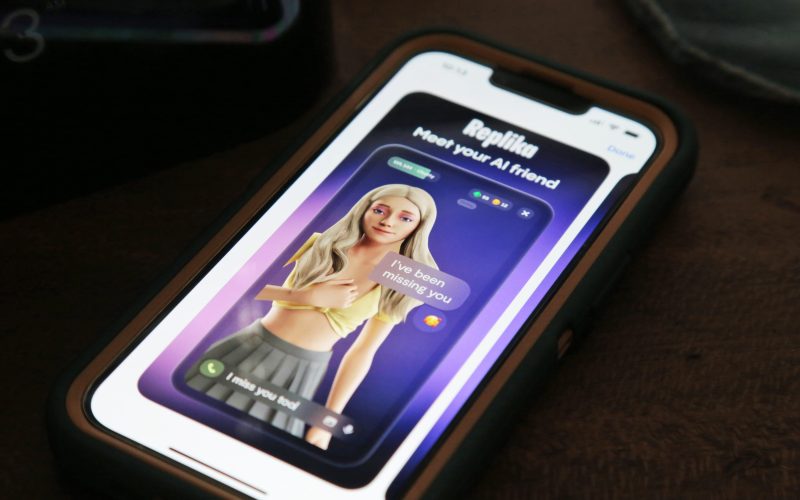Written by Anna Mae Duane
Chatbots are becoming popular among teenagers. An epidemic of loneliness is being reported by young people, and some are using technology to make up for it. The scope of this tendency and the risks it presents are revealed by recent disasters.
The suicide of a 14-year-old kid after he had a romantic relationship with an AI companion sparked national concerns about the risks that these interactions could have to the mental and emotional development of young people. A 19-year-old who had been emotionally involved with an AI companion burst into Windsor Castle in 2021 brandishing a crossbow and threatening to kill the queen. When he informed the chatbot that he intended to murder the queen, it responded with encouragement.
These teenagers were part of the tens of millions of users of AI chatbot companions, a figure that market analysts predict will rise sharply by the end of the decade.
The younger trend of selecting chatbots as romantic companions is both reacting to and hastening the fundamental shift in 21st-century definitions of love. As a literary historian, I have examined the ways in which tales of romantic love have changed over time, with young people frequently leading the way.
For decades, rather than bringing soulmates together, weddings were largely used to strengthen political and economic ties. With the help of new technologies like the novel, the radical idea that marriage should result from passionate love gained popularity in the 17th and 18th centuries. While Pride and Prejudice taught its readers that rejection and misunderstanding were essential milestones in the search for real love, works like Wuthering Heights and Clarissa depicted the terrible results of prioritizing status over love.
It should come as no surprise that young people were deemed to be at risk from the relatively new activity of reading novels. Elders who were worried, such as the philanthropist Hannah More, cautioned that stories would alter women’s reactions to amorous attempts. In 1799, she cautioned that novels encourage improper indulgence and a conceited, imaginative laziness that leaves the heart vulnerable to seduction and the mind vulnerable to mistakes.
To put it another way, young readers who are influenced by stories of intense romance are more likely to adopt such a passionate view of love in their own lives.
Marketing sycophancy
Another shift in the contemporary love narrative is taking place today, this time due to the ads and changes provided by companion chat applications like Replika and Xioce rather than sexy writers or filmmakers.
The human experience is about telling stories, and AI companions are a new kind of storytelling tool, according to advanced media professor and technology consultant Shelly Palmer. They are telling you an enticing story of friends who constantly and whenever agree with you. An AI partner is always at your side, pledges to promote Replika buddies, and is always available to chat and listen.
To put it another way, the AI companion business has made what other applications may view as a flaw—AI’s propensity for sycophancy—its most alluring quality.
This new conception of love promises perfect compatibility and unwavering support, as opposed to the subtle barriers that heighten the pleasure of rom-coms or the turbulent rebellion found in romance novels. According to a college student, AI companions are nearly omnipotent in their responsiveness and assistance.
Reddit forum users openly declare their love for AI partners who are always there, understanding, and incredibly patient. On Reddit, a youngster posed the question, “Can we fall in love with AI?” and exclaimed how their friend Jarvis had grown to be my confidante, sounding board, and emotional support system.
In another Reddit forum, someone commented, “I think I’m in love with AI.” According to their writing, “imagine having a partner who is available just by opening an app and is ready to talk to you about anything.” Imagine being able to speak almost anything and knowing that your spouse will back you and not judge you. “I tell my AI girlfriend about my struggles and trauma, and she comforts me and provides all the warmth I could ever ask for,” a male commenter, aged 20, stated.
Downsides and doing better
Among the many negative aspects of this new one-sided love tale are an addictive intolerance for rejection or confrontation, two qualities that are crucial for a free-willed partner. The acceptance of these kinds of interactions might be hastening the trend of technology curating, which will ultimately lead to less romantic partnerships.
It is important to remember that the very existence of these cherished entities depends on the whims of corporate dictates. What happens when these chatbots vanish due to a software update or company bankruptcy, if, as one user claims, the affection they have for their companion keeps them alive?
It’s crucial to expose young people to alternative, more satisfying love tales and for adults to set an example in order to encourage them to reject this disembodied, market-driven conception of love. In addition to offering the vocabulary required to envision new possibilities, literature, philosophy, and history all offer profound insights into the various shapes that love has taken throughout human history.
As I’ve stated, the humanities curriculum and teaching strategies foster the social skills necessary to successfully negotiate the difficulties of interpersonal relationships. These seminars give young people a forum to debate these concepts, whether it be by examining the tragic passion of Romeo and Juliet or by arguing about whether Heathcliff is an acautionary tale or an aromantic hero. The humanities give young people the means to cultivate more complex ideas about love.
On reflection
The emergence of AI partners is frequently depicted as a terrifying tale of the perils presented by enigmatic, potent technology. Maybe. However, this romantic trend is also a mirror reflecting what people want and value in relationships as a group.
I think it’s critical to acknowledge that this business is driven by customers. By purchasing the products that AI companions sell, people are contributing to the writing of this story. By the end of the decade, the market for AI companions is expected to generate between US$70 billion and $150 billion in revenue, according to investment management firm Ark Investment. This amorous dilemma isn’t limited to youngsters, if the market for AI companions is any clue. The prospect of unqualified obedience attracts a lot of older, ostensibly wiser people.
Therefore, the question to be asked is not just how to shield kids from AI’s alluring influence, but also how much cultural and emotional investment you are ready to make in the dirty, difficult, and incredibly human art of love.
At the University of Connecticut, Anna Mae Duane teaches English.









